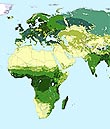Rising global temperatures over the past century are already causing large shifts in vegetation, with trees and plants increasingly moving toward the poles and up mountain slopes, according to a new study. Conduced by scientists at the University of California, Berkeley, and the U.S. Forest Service, the research combined data from hundreds of previous studies and found that 76 percent of the Earth’s land surfaces experienced significant temperatures increases in the 20th century, causing shifts in vegetation. The changes were most prominent in Arctic and sub-Arctic landscapes, where shrublands have been moving into tundra regions, and in northern Africa’s Sahel region, where woodlands are giving way to grasslands. Lead author Patrick Gonzales said the study, published in the journal Global Ecology and Biogeography, showed that vegetation shifts are “disrupting ecosystems, reducing habitat for endangered species, and altering the forests that supply water and other services to many people.” If global greenhouse gas emissions are not brought under control, the study projected that by 2100 much of the Arctic’s tundra will be replaced by boreal forest and deserts will spread in regions such as North America, Australia, and Central and South Asia.
Major Vegetation Shifts Occurring Because of Warming, Study Says
More From E360
-
ANALYSIS
As U.S. and E.U. Retreat on Climate, China Takes the Leadership Role
-
Solutions
From Ruins to Reuse: How Ukrainians Are Repurposing War Waste
-
ANALYSIS
Carbon Offsets Are Failing. Can a New Plan Save the Rainforests?
-
Energy
Facing a Hostile Administration, U.S. Offshore Wind Is in Retreat
-
Biodiversity
As Jaguars Recover, Will the Border Wall Block Their U.S. Return?
-
WATER
An E.U. Plan to Slash Micropollutants in Wastewater Is Under Attack
-
INTERVIEW
This Data Scientist Sees Progress in the Climate Change Fight
-
Climate
As Floods Worsen, Pakistan Is the Epicenter of Climate Change
-
Climate
Heat Stress Is a Major Driver of India’s Kidney Disease Epidemic
-
Energy
It’s a ‘Golden Age’ for U.S. LNG Industry, But Climate Risks Loom
-
Climate
How Climate Risks Are Putting Home Insurance Out of Reach
-
INTERVIEW
Inside the Plastics Industry Playbook: Delay, Deny, and Distract
